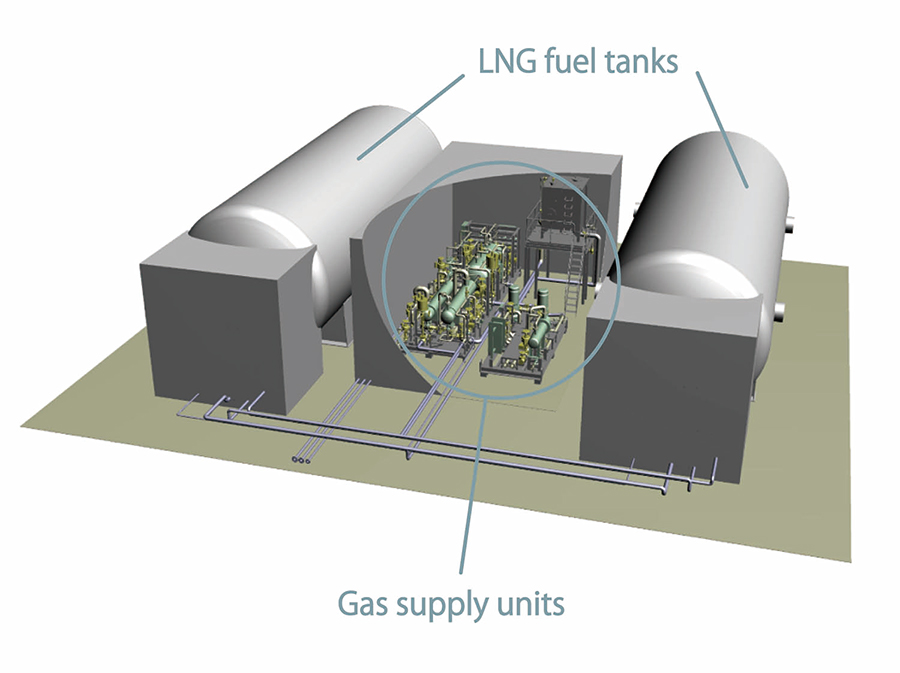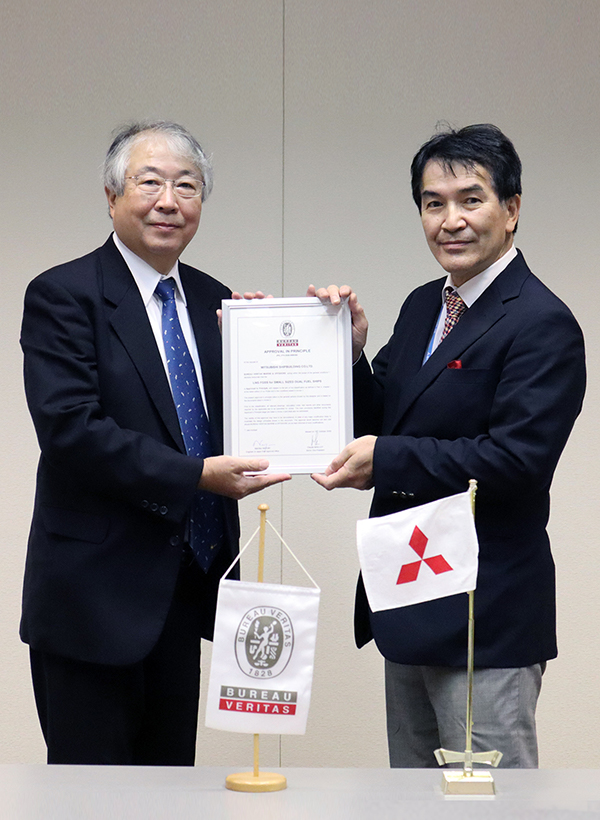AIP for Basic Design of Fueling System for Marine Four-stroke Dual Fuel Engines Obtained from French Classification Society
- Approval was granted to provide LNG fuel gas supply systems for small and mid-sized ships as well as large vessels
- AIP presentation ceremony held today in Yokohama

Mitsubishi Shipbuilding Co., Ltd., a part of Mitsubishi Heavy Industries (MHI) Group, was granted Approval in Principle (AIP) (Note1) from the French Classification Society, Bureau Veritas (BV), for a liquefied natural gas (LNG) fuel gas supply system (FGSS) for marine four-stroke dual fuel engines (Note2). The certificate of AIP was presented today at Mitsubishi Shipbuilding’s headquarters in Yokohama.
The FGSS comprises an LNG fuel tank, gas supply unit, control systems and other relevant equipment. The FGSS to which the AIP was granted this time was developed mainly to be installed on coastal ferries and small to mid-sized cargo ships, based on not only experience and knowledge obtained through shipbuilding of LNG carriers for many years but also technologies and know-how accumulated by development of FGSS products for large ships. The small size vacuum-insulated type tanks to be applied for the system have a double shell structure that ensures high heat insulation and also allows the external cylinder of the tank to be at normal temperature, which consequently simplifies the support structure of the tank and reduces the workload for the installation work. Further, the Tank Connection Space (Note3) is also designed to save space while giving consideration to realize easy operation and less maintenance.

Mitsubishi Shipbuilding delivered its FGSS in 2019 to be installed on Japan’s first LNG-fueled car carrier, currently being built at Shin Kurushima Toyohashi Shipbuilding Co., Ltd., and has one more order for the ship currently under construction. Those large tanks with insulation coatings are designed to be the best fit for the installation in large vessels.
Mitsubishi Shipbuilding will keep expanding its product lineup to meet the increasing demand for LNG fuel and will continue not only providing FGSS as a manufacturer, but also offering superior engineering services for gas handling-related equipment in order to support the design and construction of LNG-fueled ships regardless of the size and vessel type, contribute to the further development of ocean transport, and reduce the environment load.
Note 1: Approval in Principle (AIP) indicates that a certification body has reviewed the basic design, and confirmed that it meets the technical requirements and standards for safety. The inspection of this system was conducted based on the IGF Code(Note4) with which compliance is required when using LNG fuel, and BV’s ship classification regulations.
Note 2: A marine four-stroke dual fuel engine is an engine fitted mainly in small and mid-sized ships, and is able to use both conventional heavy oil and natural gas as fuel.
Note 3: Tank Connection Space is a space surrounding all tank connections and tank valves. It is required under the IGF Code for tanks with such connections in enclosed spaces.
Note 4: The International Code of Safety for Ships Using Gases or Other Low-flashpoint Fuels (IGF Code) is an international regulation stipulating the safety requirements for ships using LNG and other fuels with low flashpoints.